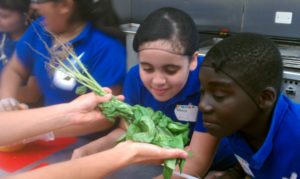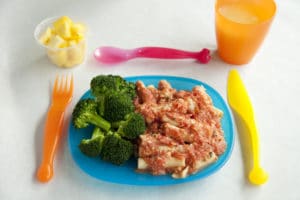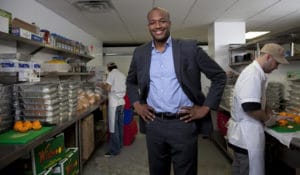Faces of our Food System: Red Rabbit

New Heights Academy Charter School– A cooking lab held in the Red Rabbit Kitchen located at 1751 Parke Ave with a group of 5th graders. The cooking labs teach children about food using all 5 senses. In this photo two students are smelling the basil they will be using to make their whole wheat pizza.
For the fourth profile in a series highlighting distributors of New York State farm-grown products, I spoke to Rhys Powell. Rhys is the Founder and President of Red Rabbit, located in New York City. Red Rabbit was founded in 2005 “to fix the school food system”. According to their website, they do this in three key ways, by: “partnering with local schools and providing them kid-tested, made from scratch, customized healthy meal programs; working with local farmers, suppliers and artisans to optimize the nutritional value of all meals, promoting sustainability while supporting and growing the local economy; and, educating kids, teachers, families and communities about wellness, nutrition and healthy eating choices so they can make the right decisions for themselves when not in school. And the best part is…this is all done at or below the current Federal reimbursement level.”
Q: How did you get the idea to start Red Rabbit?
A: A friend of mine was having trouble finding healthy food for his four year old. He was looking for an option so he didn’t have to cook her lunch every day. I agreed to help him and once I started looking, I realized that there were no good options.
Q: How is Red Rabbit able to provide locally-grown products at or below the federal reimbursement level?
A: One of the main ways is by working with local farms. One of the big misconceptions out there is that locally sourced produce has to be more expensive than traditionally sourced products. We found that is not the case. We also cook all of our meals from scratch so we have strict control over the ingredients used and the costs of the ingredients.
Q: To how many schools do you currently supply meals?
A: During the 2011-2012 school year we supplied meals to about 70 schools. We are hoping to increase that number to 100 for this coming school year. We supply meals to a mix of public, private and charter schools.

In this photo – an actual Red Rabbit school meal made with whole grain ziti pasta with part-skim mozzarella and parmesan cheeses in our house-made marinara sauce. A side of farm fresh, locally sourced steamed broccoli and locally sourced seasonal fresh cut fruit and a glass of nonfat milk from local partner RonnyBrook Farms.
Q: Is it easier to work with private schools than public schools?
A: While we have found a lot of success working with private schools and charter schools, the public schools, particularly in NYC, are challenging. I think it has to do with the fact that the public schools are all controlled by the Department of Education, and there is a lot of bureaucracy. It is difficult to determine who is a decision maker, who you need to approach in order to offer your services.
Q: How many growers do you work with and where are they located?
A: It changes based on the season, but in the height of the season, we work with about two dozen local farmers and artisans. Our local farmers and artisans are all currently located in the tri-state area.
Q: How do you define ‘local’ and ‘artisan’?
A: We define local as in our region – 200 miles from NYC – but we don’t have a hard definition. We definitely consider the tri-state region local. We do our best to source product from local producers, but sometimes we cannot find them – or we cannot find them in the quantity we need – and so we work with artisans. For example, we work with an artisan business called ‘All Natural Bakeries’ located in Long Island City.
We define artisan by encompassing various things such as scale (niche market vs. national/mass market), the people involved in the process, the way they source and produce their products and their mutual commitment to top quality. We visited All Natural Bakeries and their facility before we started working with them. We met with their head baker and learned about the ingredients they use. It is that level of access for which we look. We don’t have specific requirements that all of our suppliers allow us to visit, but all of the farmers and artisans we work with have offered this to us and we try to get out to visit and learn more about their operation.
Q: As you are based in NYC, how do you find and make connections with growers?
A: A lot of on-the-ground work! We have been running around for the last 4-5 years and have built up a network. Grow NYC has been very helpful – especially in the beginning years. It is mostly about our commitment to going out and meeting people and being open with local growers. When growers contact us, even if we aren’t ready to start working together at that moment, we keep the conversation open with them.

Rhys Powell, the Founder and President of Red Rabbit stands in the company’s fresh fruit prep area with two kitchen team members.
Q: Are all of the products procured by Red Rabbit ‘local’?
A: Not all products are local and artisan, we have to supplement. We have found that the supply is not stable enough to provide us with all of our needs – particularly in the off-season. And there are items we just can’t get locally, like pineapples. However, any vendor we do work with, no matter where they are located, is first vetted by us to ensure they are in-line with Red Rabbit’s commitment to providing top quality ingredients to make healthy food for our kids.
Q: How do you get product from local growers to your distribution center (in Harlem)?
A: Though this can be a challenge, we are working with a combination of own vehicles and arrangements with the growers—including picking up at local green markets (farmers’ markets in NYC), where many of our farmers come as part of their business. The infrastructure is a work in progress.
Q: Do you work with other NYS distributors as well?
A: Yes, we have done some work with other distributors, but sometimes it is difficult for us to work with another middle business in terms of reaching an amenable price point. We are continuing conversations with a few distributors and will see if there are more opportunities to work together in the future.
Q: Are all the producers you purchase from GAP certified? Are there other types of certification or inspection that you require?
A: No, we do not require farmers to be GAP certified. We don’t have specific certification or inspection requirements ourselves, but go through a vetting process with every farm we work with—allowing us to visit the farm and have open communication with us regarding their growing, harvesting and handling practices so we are confident in their ability to provide top quality products that meet our criteria for health and wellness.
Q: What are the challenges you face working with local growers and/or obtaining locally grown products?
A: Pack size is one of the challenges – inconsistent pack size. It is something we have found work-arounds for, but it is an added step in the process. We buy vegetables that school kids really like – broccoli, green beans, carrots, corn, tomatoes, and cauliflower. We buy products fresh from growers and then we cook them. In the off-season we sometimes work with a processor – like Farm to Table Co-Packers. We also got an idea from a facility we just visited in Massachusetts. They purchase vegetables in bulk from growers – similarly to how the contract growers operate. Growers drop off a truckload of vegetables, without wasting time or money putting them the produce into smaller boxes. We believe this could save growers – who often spend up to $2/box – and help us keep costs down. We purchase in high volume, so we are very optimistic about trying this.
Q: Are you looking for additional growers?
A: Yes – we are always looking for the items we mentioned above. If farmers are interested in working with us, they can learn more about us on our website and call/email us at T: 866.697.3372 E: help@myredrabbit.com.
However, farmers should be aware that a minimum order for us is currently at least 500 lbs – so we are looking for growers able to supply that sort of quantity.
For more information, please feel free to contact the author at rb223@cornell.edu. The author wishes to thank the following funders for their support of local food distribution research: the Cornell Center for a Sustainable Future, NESARE, and the Cornell Small Farm Program.

